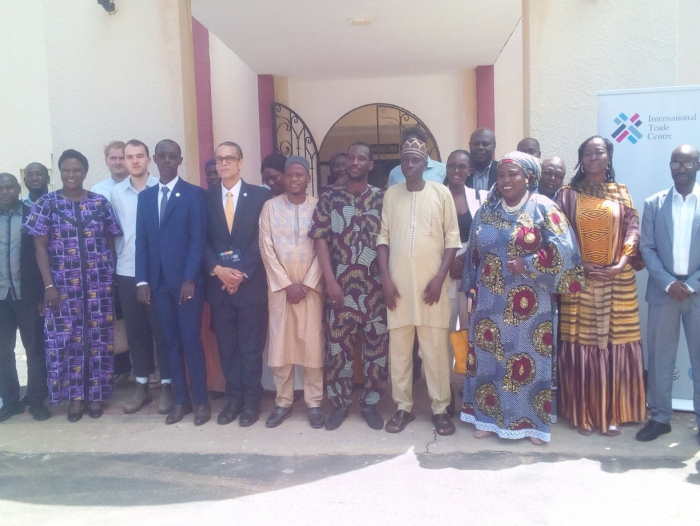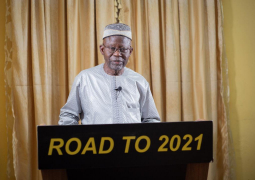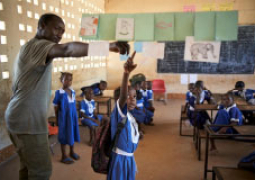
The event held at Ocean Bay, Cape Point, is part of a project titled “Empowering Communities for Resilient Food Systems in Foni” and funded through the Joint Sustainable Development Goal (SDG) Fund of the United Nations (UN) and partners.
In essence, this programme seeks to leverage home-grown school feeding as a catalyst to strengthen local governance, integrate smallholder farmers into structured markets, while promoting community awareness of nutrition and sustainable practices.
At the launch, Malick Ndiaye, deputy director and head of programmes at World Food Programme, reminded that Foni has a lot of potential in agriculture as well as opportunities for market in view of its proximity to the Greater Banjul area.
"But still we have a lot of challenge. And this project has two main objectives; the first is really to localize the governance of the school feeding. The central level has a critical role with regard to the implementation of the school feeding."
The WFP deputy country representative noted that they would like to see the local councils being more involved in the project, noting that the project would create market opportunities for the smallholder farmers.
"So that's why it has a double impact in terms of localisation."
He said it will encourage farmers to be more involved in the implementation of the school feeding programme, pointing out that the home grown school programme is serving as a catalyst.
Yusupha Keita, Country rep of the International Trade Centre, acknowledged that that is a project that speaks directly to the needs and aspirations of our communities in the West Coast region, particularly Foni.
"Allow me first to express our deep appreciation to the United Nations Joint SDG Fund, the European Union and its member states for their generous support to the people of The Gambia."
Keita thanked the UN Resident Coordinator's office for their foresight in facilitating the project; that truly seeks to localise Sustainable Development Goals and ensure that no one is left behind.
The project, he added, builds on the work of the UN Peacebuilding Fund and the Human Security Programme that were implemented in the Fonis and Lower River and North Bank Regions, reinforcing the lessons learned and scaling up the gains.
"As part of this initiative, the International Trade Centre will focus on improving market access, promoting sustainable agricultural practices and strengthening local capacities through a human security approach."
For his part, Karl Frederick Paul, United Nations Resident Coordinator in The Gambia, on behalf of the United Nations system, expressed delight to be associated with the event.
He underscored the importance of the project, which seeks to empower Foni communities for resilient food system.
"I firmly believe that by enhancing collaboration, uniting our effort, and cultivating meaningful synergies, we can jointly accelerate development and build a stronger Gambia for the future."
This joint initiative, he added, led by the World Food Program and International Trade Center (ITC), in close cooperation with the government of The Gambia will allow them to continue to tread their joint paths toward this objective.
"By addressing systemic challenges in governance, market access, and sustainability, this project seeks to address inequalities and build resilience, to ensure that no one is left behind by creating a scalable model for sustainable development in the country.”
The project, he further added, is being funded by the Joint Sustainable Development Goal SDG Fund for the United Nations and partners, which is an innovative financing mechanism strategically designed to drive transformative and catalytic development in communities.
Dr. Omar Eba, Principal Education Officer, School Feeding Unit at the Ministry of Basic and Secondary Education, (MoBSE) on behalf of the Director of In-Service Training and Lifelong Learning at MoBSE, thanked WFP and ITC on behalf of the Minister for this laudable initiative.
"In The Gambia, the World Food Programme has been providing school meals to a vast number of school children since 1970. They continue to provide these meals to lower basic schools, madrassas, Early Childhood Development Centers in selected and most vulnerable areas of this country."
He also made reference to research, which shows that school feeding increases enrolment, retention and completion rate, especially among the girl child.
"It also helps in improving the nutrition level of school children."
Mahamadou Ceesay, chairman of GALGA, described the project as one that embodies collective commitment to strengthening food security while enhancing resilience in communities.
He added that the move would also help in combating food insecurity while promoting sustainable agricultural practices in the country.
Ceesay pointed out that as the country stands at a cross roads of critical challenges including climate change, poverty and malnutrition, it is imperative the country adopts a holistic and integrated approach to the country’s food systems.
The launch was graced by the diplomatic community, local councils, UN Systems and key stakeholders.





